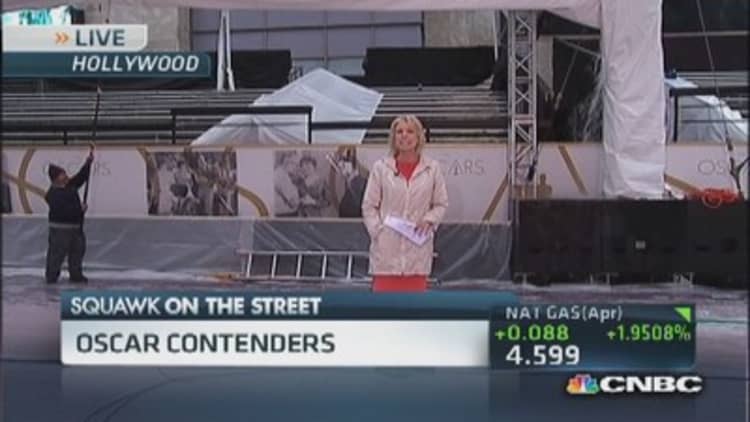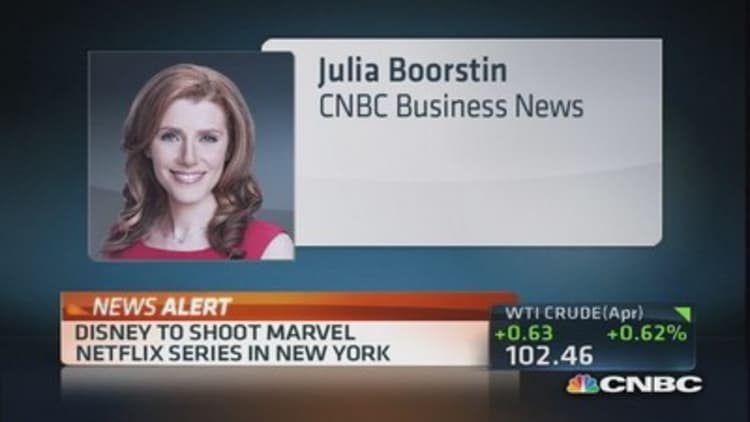
Sunday night is the biggest night in Hollywood.
Except ...
Much of "Hollywood" has left Hollywood.
Winners probably won't see a big post-Oscar boost.
Many of the nominated films were financed outside traditional channels.
The movie business set a box-office record last year, with $10.9 billion in ticket sales. But while ticket prices rose, the actual number of tickets sold fell.
It has become harder to compete for consumers' attention, especially when they can stay home and watch former Oscar-winning actors on their television or computer, such as Kevin Spacey in "House of Cards," or Jessica Lange in "American Horror Story."
(Read more: No such thing as a 'Best Picture' box office boost)
Of course, that quality of competition may be leading to better movies.
"There are nine best picture nominees—all of them worthy," said Paul Dergarabedian of media analytics firm Rentrak.
Charles Roven and Richard Suckle, who produced "American Hustle," agree.
"It does raise the bar," said Suckle, who added, "I don't think it's necessarily competitive. I just think it's good for the business because there's a lot of choices."
Roven added, "You better have good quality whatever you're going to do, whether it's TV or movies, because no one's going to come back for the second time or even go to the theater for the first viewing."
Box office revenue for the Oscars 2014 Best Picture Nominees
| Picture | Studio | Box Office |
| Gravity | Warner Bros. | $269,429,937.00 |
| American Hustle | Sony/Columbia | $144,430,111.00 |
| The Wolf of Wall Street | Paramount | $113,076,533.00 |
| Captain Phillips | Sony/Columbia | $106,957,071.00 |
| 12 Years a Slave | Fox Searchlight | $49,208,604.00 |
| Philomena | Weinstein Company | $33,040,213.00 |
| Dallas Buyers Club | Focus Features | $24,808,796.00 |
| Her (2013) | Warner Bros. | $24,071,604.00 |
| Nebraska | Paramount | $16,614,827.00 |
| Total Gross: $781,637,696 | ||
| Average Gross: $86,848,633 |
Source: Source: Box Office Mojo, a subsidiary of IMBD
The two are of course hoping for a Best Picture win Sunday night.
What could that mean to the bottom line? Dergarabedian believes this is one case where just being nominated is more important.
"The six-week period between the Oscar nominations announcement and the telecast is where films can get their biggest boost at the box office," he said. "Films that might be otherwise dead in the water, finished in theaters, suddenly have hundreds of theaters added to capitalize on that newfound Oscar notoriety."
For example, "12 Years a Slave" was released in October, but after being nominated for Best Picture in January, Fox put the movie in 647 more theaters, according to Rentrak. Ticket sales jumped 471 percent the following weekend.
(Read more: 'The Lego Movie' is anti-business. Get over it)
Making a successful movie still requires a great script, director and cast, and a lot of luck, and there is less room for failure. Studios have become unwilling to fully finance anything other than a few big films.
" 'Dallas Buyers Club' lost half their financing before they went to shoot," Roven said. "They had to shoot with all natural lights," Suckle added.
Even so, the two producers say, it's a "bouyant time" to make movies. "There's just a lot more—I think the most—independent finance I've seen around, maybe ever," Roven said.
For "American Hustle," Sony would commit only to partial funding. Roven and Suckle got more money by cutting a deal with producer Megan Ellison, whose father is Oracle CEO Larry Ellison, one of the richest men in the world. But most of the needed cash came from foreign distributors who signed on at the Cannes Film Festival in 2012, before filming even began.
"We did what they call 'selling out,' " Roven said. "We sold almost every territory at that one festival, which is unusual. ... That squeezes—in a good way—your risk, but it also hurts your upside."
(Read more: )
"American Hustle" was eventually filmed in Boston and New York. That shaved as much as $8 million off production costs compared with filming in California, because of the more generous film incentives in Massachusetts and New York.
"My early movies were all made here, and now none of them are made here," said Roven in his Atlas Entertainment offices above the Sunset Strip.
Runaway production costs are a problem that don't seem to have a Hollywood ending. The Milken Institute reports that California lost more than 16,000 film and TV jobs between 2004 and 2012, while New York gained over 10,000, "even though New York is a more expensive place to film."
Just this week, Disney CEO Robert Iger appeared in Gotham to announce that Disney and Netflix will shoot a Marvel TV series there, bringing with it 3,000 jobs.
Can Hollywood regain lost ground?
New York gives away four times as much refundable credit to films as California does. The Milken Institute recommends that the Golden State add more to the incentive pot and expand the types of projects that qualify—such as digital effects productions or movies with blockbuster budgets of over $75 million. Roven and Suckle said they still do a lot of post-production work—editing—in Los Angeles, but even visual effects are done elsewhere.
"It's a topic of conversation that comes up all the time," said Suckle. "I know so many crew members who would actually take less money to work in California, to be able to go home every night, sleep in their own beds and be with their families, versus going out of town. ... But we haven't been able to figure it out effectively."
(Read more: Four market moves that Cramer doesn't like)
And then there's the Netflix effect, changing the way consumers get content and providing original content that lets viewers "binge view " on weekends, keeping them out of movie theaters.
But Netflix is doing more than drawing away potential moviegoers with quality TV. It now has a presence at the Oscars itself, having helped fund and distribute "The Square," a documentary about the Arab Spring in Egypt.
"It's very difficult to create the business model for a film like this, because you're following a moment in history that you're not sure when it's going to end," said the film's producer, Karim Amer.

"The Square" was self-funded in the beginning, then received grant money and proceeds from a Kickstarter campaign, until, finally, Netflix got involved.
"It's a game changer," said director Jehane Noujaim. "As a documentary maker, it's very exciting to see the kind of muscle that they have put into our film and the attention they've given to it."
Theirs is the first Egyptian film ever nominated for an Oscar, though Egyptian authorities have not allowed "The Square" to be screened inside the country. Locals have been able to watch it on YouTube, though, and it has become a hit in cities including Kiev, Caracas and Mexico City.
(Read more: Highest-rated Oscars ever? See the numbers here)
Amer credits Netflix's business model with creating a viable market for documentaries.
"It frees you from having to appeal to this bell curve audience, and to show that there are direct clusters of targeted audiences that care—and together that's a loud voice," he said.
When asked if this new business model for documentaries was making them any money, Noujaim and Amer paused, then laughed.
"My mother has said, 'Jehane, it's a job when you actually make a living. Until you do that, it's called a hobby. So enjoy your hobby and get a job when you can.' "
—By CNBC's Jane Wells; follow her on Twitter: @janewells. CNBC's Evelyn Cheng contributed to this report.


